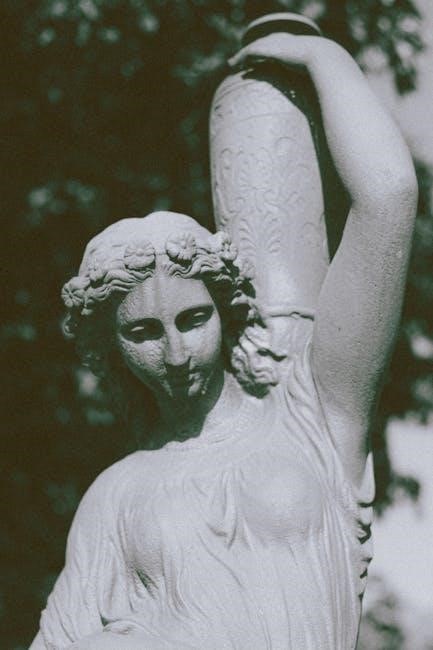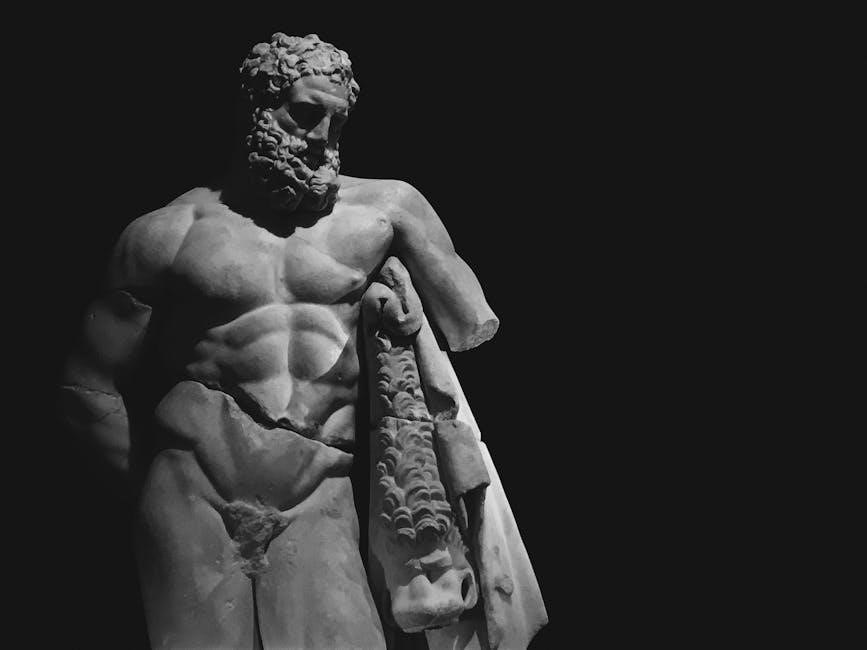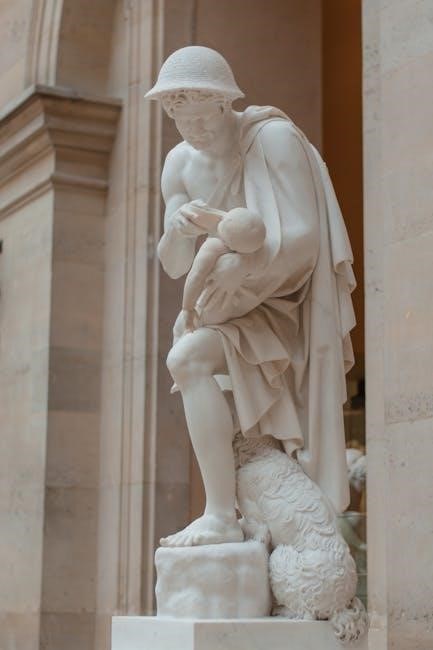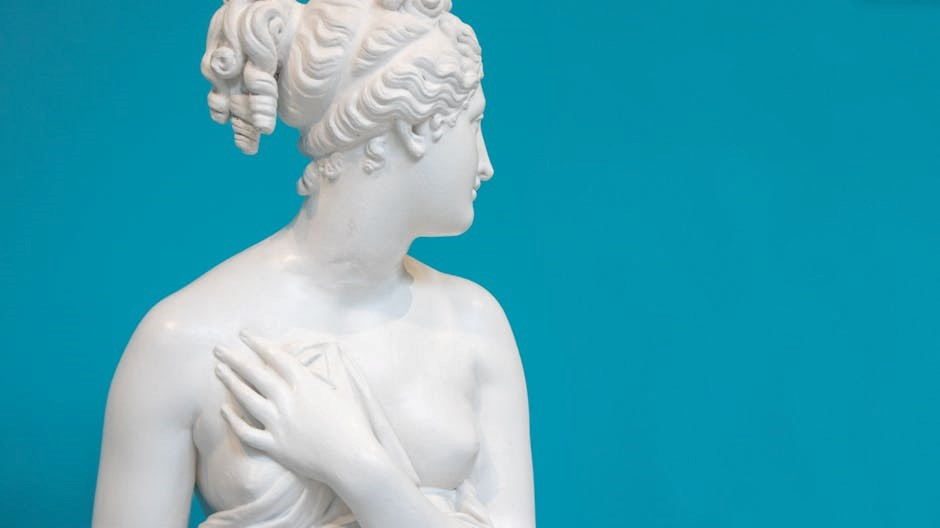Percy Jackson and Greek Heroes: An Overview
Rick Riordan’s “Percy Jackson” series masterfully intertwines contemporary storytelling with classic Greek mythology, offering young readers an accessible entry point. The series explores the adventures of Percy Jackson, a demigod navigating a world filled with gods, monsters, and heroic quests.

Rick Riordan and the Percy Jackson Series
Rick Riordan, the author behind the globally acclaimed “Percy Jackson” series, is celebrated for his ability to breathe new life into ancient tales. Inspired by his son’s interest in Greek mythology, Riordan crafted a world where gods and monsters exist alongside modern society. The series, beginning with “The Lightning Thief,” follows Percy Jackson, a demigod son of Poseidon, as he discovers his heritage and embarks on perilous quests.
Riordan’s writing style blends humor, action, and educational elements, making Greek mythology accessible and engaging for young readers. The success of “Percy Jackson” has spawned multiple sequels, spin-offs, and adaptations, solidifying Riordan’s place as a leading figure in children’s literature. His works have sparked renewed interest in classical mythology, inspiring a generation to explore the timeless stories of gods and heroes.
Riordan’s dedication to crafting compelling narratives and relatable characters has made the “Percy Jackson” series a beloved and enduring phenomenon. His books serve as both entertainment and an introduction to the rich cultural heritage of ancient Greece.
Percy Jackson’s Greek Gods: A Humorous Retelling
“Percy Jackson’s Greek Gods,” penned by Rick Riordan and narrated by Percy himself, offers a fresh and comedic perspective on classical mythology. Released in 2014, this book presents Percy Jackson’s witty and irreverent take on the origin stories and exploits of the Olympian gods. Riordan masterfully blends humor with mythological accuracy, creating an engaging and accessible read for fans of all ages.
Through Percy’s narration, the gods are portrayed with their flaws and eccentricities on full display, making them relatable and entertaining characters. The book provides a lighthearted yet informative introduction to the Greek pantheon, covering each god’s domain, personality, and key myths. Riordan’s storytelling approach ensures that readers not only learn about Greek mythology but also enjoy the process, making it a perfect companion to the main “Percy Jackson” series.
Percy’s humorous commentary and modern language make the ancient myths feel relevant and engaging for contemporary audiences, solidifying the book’s popularity and appeal.
Percy Jackson’s Greek Heroes: A Contemporary Spin
“Percy Jackson’s Greek Heroes” offers a modern and engaging twist on the legendary figures of Greek mythology, as told through the eyes of Percy Jackson. Rick Riordan breathes new life into these ancient tales by infusing them with Percy’s signature wit and contemporary voice. This approach makes the stories accessible and relatable to young readers, who might otherwise find the classical versions daunting or irrelevant.
The book presents a curated selection of twelve prominent Greek heroes, including Perseus, Theseus, and Hercules, each with their own unique challenges and triumphs. Through Percy’s narration, the heroes’ strengths and flaws are highlighted, showcasing their humanity amidst their extraordinary feats. Riordan skillfully balances entertainment with education, ensuring that readers not only enjoy the stories but also gain a deeper understanding of Greek mythology and its enduring themes.
By framing the narratives through a modern lens, Riordan encourages readers to connect with these heroes on a personal level, appreciating their courage, resilience, and the timeless lessons they offer.

The Connection Between Percy Jackson and Greek Mythology
The “Percy Jackson” series is deeply rooted in Greek mythology, weaving ancient tales into its narrative. It provides a captivating gateway for young readers to explore the rich tapestry of myths and legends in a fun and engaging way.
Percy as Perseus
Percy Jackson’s name is derived from the Greek hero Perseus, foreshadowing his heroic journey. Like Perseus, Percy demonstrates courage, resourcefulness, and strength in the face of danger. In “The Lightning Thief,” Percy mirrors Perseus’s feat by battling Medusa, showcasing a direct parallel between the characters. Both heroes confront monstrous foes and undertake perilous quests, solidifying the connection.
This mirroring serves to introduce young readers to classic mythological figures through a contemporary lens. Percy’s adventures echo the trials and triumphs of Perseus, making Greek mythology relatable and exciting. By associating Percy with Perseus, Riordan establishes a lineage of heroism, suggesting that Percy is destined for greatness, just like his namesake. This connection adds depth to Percy’s character.
Ultimately, the parallel between Percy and Perseus enriches the narrative, fostering a deeper appreciation for Greek mythology and its enduring themes of bravery and resilience.

Key Greek Heroes Featured in Percy Jackson’s Books
Rick Riordan showcases numerous Greek heroes within the “Percy Jackson” series, including Perseus, Theseus, and Hercules. These figures enrich the narrative, providing young readers with engaging introductions to classic mythological characters and their legendary deeds.
Perseus
Perseus, a prominent figure in Greek mythology, is celebrated for his courage, strength, and resourcefulness. His most renowned feat involves slaying Medusa, the Gorgon whose gaze could turn men to stone. Armed with a mirrored shield from Athena, winged sandals from Hermes, and a sickle, Perseus cleverly beheaded Medusa.
His adventures extend beyond Medusa, including the rescue of Princess Andromeda from a sea monster sent by Poseidon. Perseus faced numerous challenges, consistently demonstrating his heroic qualities and reliance on divine assistance. He is a symbol of bravery, determination, and the triumph of good over evil, inspiring generations through his mythological exploits.
Percy Jackson’s name is derived from Perseus, hinting at shared qualities. Both characters display courage, resilience, and a willingness to confront formidable foes. While Percy’s adventures are set in a contemporary world, the echoes of Perseus’s legacy resonate throughout his heroic journey, creating a compelling link between ancient myth and modern fantasy.
Theseus
Theseus, a legendary Athenian hero, is best known for his courageous defeat of the Minotaur, a fearsome creature dwelling within the Labyrinth on Crete. To accomplish this daunting task, Theseus journeyed to Crete and, with the help of Ariadne, who provided him with a ball of thread to navigate the Labyrinth, he confronted and slew the Minotaur.
Beyond his encounter with the Minotaur, Theseus is credited with uniting Attica under Athenian rule, establishing Athens as a major power. He is often portrayed as a wise and just ruler, dedicated to the welfare of his people. Theseus’s legacy extends beyond his heroic deeds, encompassing his political and social contributions to Athenian society.
Theseus embodies the ideals of courage, intelligence, and leadership, making him a quintessential Greek hero. His stories continue to inspire and captivate, showcasing the enduring appeal of Greek mythology. The character of Theseus reflects the values of his time and serves as a model for future generations.
Hercules
Hercules, also known as Heracles, stands as one of the most iconic figures in Greek mythology, celebrated for his unparalleled strength and legendary twelve labors. Born of Zeus and the mortal Alcmene, Hercules faced trials orchestrated by Hera, Zeus’s jealous wife. These labors, ranging from slaying the Nemean Lion to capturing Cerberus, the guardian of the Underworld, tested his physical and mental endurance.
Despite his immense power, Hercules was not immune to tragedy, often succumbing to fits of rage and committing regrettable acts. His journey is one of redemption, as he sought to atone for his mistakes through acts of heroism. Hercules’s story explores the complexities of human nature, showcasing both strength and vulnerability.
Hercules’s legacy endures as a symbol of strength, perseverance, and the potential for redemption. His trials and tribulations resonate with audiences, highlighting the enduring power of the human spirit. Hercules remains a prominent figure in popular culture, inspiring countless stories and adaptations.

The Role of the Olympian Gods in Percy Jackson
The Olympian Gods form the backbone of the “Percy Jackson” series, serving as powerful figures who directly influence the lives of demigods and mortals alike. Each Olympian possesses distinct personalities, domains, and relationships that shape the events of the stories. Zeus, the king of the gods, reigns supreme, while Poseidon, Percy’s father, controls the seas, and Hades governs the Underworld.
These gods are far from perfect, exhibiting flaws, biases, and familial conflicts that add depth and complexity to their characters. Their interactions with their demigod children are often fraught with challenges, reflecting the complexities of parental relationships and the burdens of godly heritage. The gods’ involvement in the mortal world creates both opportunities and dangers for Percy and his friends.
The series explores the consequences of divine intervention, highlighting the importance of free will and the responsibility that comes with wielding power. The Olympian Gods are not simply distant figures of worship, but active participants in the ongoing struggles between good and evil, shaping the destiny of both gods and mortals.
Educational Value and Accessibility for Young Readers
The “Percy Jackson” series possesses significant educational value, introducing young readers to Greek mythology in an engaging and accessible manner. Rick Riordan masterfully simplifies complex myths and legends, making them understandable and relatable for a younger audience. The books seamlessly weave mythological elements into a contemporary setting, creating a captivating blend of fantasy and education.
The series sparks an interest in classical literature, encouraging readers to explore the original myths and learn about ancient Greek culture, history, and values. Riordan’s writing style is humorous and fast-paced, capturing the attention of even reluctant readers. The books address themes of friendship, courage, self-acceptance, and the importance of standing up for what is right, fostering valuable life lessons.
Furthermore, the “Percy Jackson” series celebrates diversity and inclusivity, featuring characters with various backgrounds, abilities, and identities. By presenting mythology in a modern and relatable context, the books make learning fun and accessible, inspiring a lifelong love of reading and knowledge.
Percy Jackson’s Impact on Popularizing Greek Mythology
The “Percy Jackson” series has undeniably revitalized interest in Greek mythology among young readers globally. Rick Riordan’s engaging narrative style and relatable characters have transformed ancient myths into captivating stories for a contemporary audience. The series’ success has sparked a renewed fascination with Greek gods, heroes, and monsters, leading to increased exploration of classical literature and mythology in schools and homes.
The books have inspired countless young people to delve deeper into Greek culture, history, and art. The series’ popularity has also led to the creation of numerous spin-offs, adaptations, and related merchandise, further expanding its reach and impact. By presenting mythology in a modern and accessible format, “Percy Jackson” has democratized learning about ancient Greece, making it fun and engaging for readers of all backgrounds.
The series has also encouraged critical thinking about the relevance of ancient stories to contemporary issues, prompting discussions about heroism, morality, and the human condition. “Percy Jackson” has undoubtedly left a lasting legacy, fostering a lifelong appreciation for Greek mythology and its enduring influence on literature, art, and culture.

Leave a Reply
You must be logged in to post a comment.